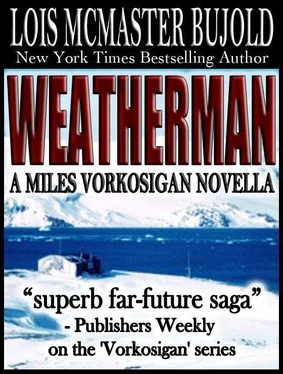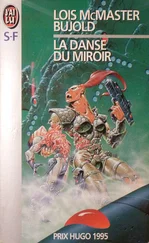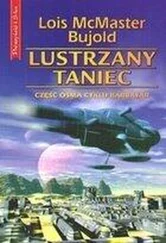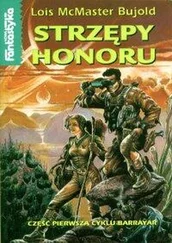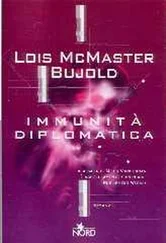Lois Bujold - Weatherman
Здесь есть возможность читать онлайн «Lois Bujold - Weatherman» весь текст электронной книги совершенно бесплатно (целиком полную версию без сокращений). В некоторых случаях можно слушать аудио, скачать через торрент в формате fb2 и присутствует краткое содержание. Год выпуска: 2011, Жанр: Фантастика и фэнтези, на английском языке. Описание произведения, (предисловие) а так же отзывы посетителей доступны на портале библиотеки ЛибКат.
- Название:Weatherman
- Автор:
- Жанр:
- Год:2011
- ISBN:нет данных
- Рейтинг книги:4 / 5. Голосов: 1
-
Избранное:Добавить в избранное
- Отзывы:
-
Ваша оценка:
- 80
- 1
- 2
- 3
- 4
- 5
Weatherman: краткое содержание, описание и аннотация
Предлагаем к чтению аннотацию, описание, краткое содержание или предисловие (зависит от того, что написал сам автор книги «Weatherman»). Если вы не нашли необходимую информацию о книге — напишите в комментариях, мы постараемся отыскать её.
A story later incorporated into the Hugo Award-winning novel THE VOR GAME.
Weatherman — читать онлайн бесплатно полную книгу (весь текст) целиком
Ниже представлен текст книги, разбитый по страницам. Система сохранения места последней прочитанной страницы, позволяет с удобством читать онлайн бесплатно книгу «Weatherman», без необходимости каждый раз заново искать на чём Вы остановились. Поставьте закладку, и сможете в любой момент перейти на страницу, на которой закончили чтение.
Интервал:
Закладка:
Kyril Island was an egg-shaped lump about seventy kilometers wide and one-hundred-sixty kilometers long, and over five hundred kilometers from the next land of any description. Lumpy and brown described most of it, both base and island. The majority of the nearby buildings, including Miles’s officers’ barracks, were dug in, topped with native turf. Nobody had bothered with agricultural terraforming here. The island retained its original Barrayaran ecology, scarred by use and abuse. Long fat rolls of turf covered the barracks for the winter infantry trainees, now empty and silent. Muddy water-filled ruts fanned out to deserted marksmanship ranges, obstacle courses, and pocked live-ammo practice areas.
To the near south, the leaden sea heaved, muting the sun’s best efforts at sparkle. To the far north a gray line marked the border of the tundra at a chain of dead volcanic mountains.
Miles had taken his own officers’ short course in winter maneuvers in the Black Escarpment, mountain country deep in Barrayar’s second continent; plenty of snow, to be sure, and murderous terrain, but the air had been dry and crisp and stimulating. Even today, at high summer, the sea dampness seemed to creep up under his loose parka and gnaw his bones at every old break. Miles shrugged against it, without effect.
Ahn, still draped over the railing, glanced sideways at Miles at this movement. “So tell me, ah, Ensign, are you any relation to the Vorkosigan? I wondered, when I saw the name on the orders the other day.”
“My father,” said Miles shortly.
“Good God.” Ahn blinked and straightened, then sagged selfconsciously back onto his elbows as before. “Good God,” he repeated. He chewed his lip in fascination, dulled eyes briefly alight with honest curiosity. “What’s he really like?”
What an impossible question , Miles thought in exasperation. Admiral Count Aral Vorkosigan, the colossus of Barrayaran history in this half-century. Conqueror of Komarr, hero of the ghastly retreat from Escobar, for sixteen years Lord Regent of Barrayar during Emperor Gregor’s troubled minority; the Emperor’s trusted Prime Minister in the four years since. Destroyer of Vordarian’s Pretendership, engineer of the peculiar victory of the third Cetagandan war, unshaken tiger-rider of Barrayar’s murderous internecine politics for the past two decades. The Vorkosigan.
I have seen him laugh in pure delight, standing on the dock at Vorkosigan Surleau and yelling instructions over the water, the morning I first sailed, dumped, and righted the skimmer by myself. I have seen him weep till his nose ran, more dead drunk than you were yesterday, Ahn, the night we got the word Major Duvallier was executed for espionage. I have seen him rage, so brick-red we feared for his heart, when the reports came in fully detailing the stupidities that led to the last riots in Solstice. I have seen him wandering around Vorkosigan House at dawn in his underwear, yawning and prodding my sleepy mother into helping him find two matching socks. He’s not like anything, Ahn. He’s the original.
“He cares about Barrayar,” Miles said aloud at last, as the silence grew awkward. “He’s . . . a hard act to follow.” And, oh yes, his only child is a deformed mutant. That, too.
“I should think so.” Ahn blew out his breath in sympathy, or maybe it was nausea.
Miles decided he could tolerate Ahn’s sympathy. There seemed no hint in it of the damned patronizing pity, nor, interestingly, of the more common repugnance. It’s because I’m his replacement here, Miles decided. I could have two heads and he’d still be overjoyed to meet me.
“That what you’re doing, following in the old man’s footsteps?” said Ahn equably. And more dubiously, looking around, “Here?”
“I’m Vor,” said Miles impatiently. “I serve. Or at any rate, I try to. Wherever I’m put. That was the deal.”
Ahn shrugged bafflement, whether at Miles or at the vagaries of the Service that had sent him to Kyril Island, Miles could not tell. “Well.” He pushed himself up off the rail with a grunt. “No wah-wah warnings today.”
“No what warnings?”
Ahn yawned, and tapped an array of figures—pulled out of thin air, as far as Miles could tell—into his report panel representing hour-by-hour predictions for today’s weather. “Wah-wah. Didn’t anybody tell you about the wah-wah?”
“No . . .”
“They should have, first thing. Bloody dangerous, the wah-wah.”
Miles began to wonder if Ahn was trying to diddle his head. Practical jokes could be a subtle enough form of victimization to penetrate even the defenses of rank, Miles had found. The honest hatred of a beating inflicted only physical pain.
Ahn leaned across the railing again to point. “You notice all those ropes, strung from door to door between buildings? That’s for when the wah-wah comes up. You hang onto ’em to keep from being blown away. If you lose your grip, don’t fling out your arms to try and stop yourself. I’ve seen more guys break their wrists that way. Go into a ball and roll.”
“What the hell’s a wah-wah? Sir.”
“Big wind. Sudden. I’ve seen it go from dead calm to a hundred-sixty kilometers, with a temperature drop from ten degrees cee above freezing to twenty below, in seven minutes. It can last from ten minutes to two days. They almost always blow up from the northwest, here, when conditions are right. The remote station on the coast gives us about a twenty-minute warning. We blow a siren. That means you must never let yourself get caught without your cold gear, or more than fifteen minutes away from a bunker. There’s bunkers all around the grubs’ practice fields out there.” Ahn waved his arm in that direction. He seemed quite serious, even earnest. “You hear that siren, you run like hell for cover. The size you are, if you ever got picked up and blown into the sea, they’d never find you again.”
“All right,” said Miles, silently resolving to check out these alleged facts in the base’s weather records at the first opportunity. He craned his neck for a look at Ahn’s report panel. “Where did you read off those numbers from, that you just entered on there?”
Ahn stared at his report panel in surprise. “Well—they’re the right figures.”
“I wasn’t questioning their accuracy,” said Miles patiently. “I want to know how you came up with them. So I can do it tomorrow, while you’re still here to correct me.”
Ahn waved his free hand in an abortive, frustrated gesture. “Well . . .”
“You’re not just making them up, are you?” said Miles in suspicion.
“No!” said Ahn. “I hadn’t thought about it, but . . . it’s the way the day smells, I guess.” He inhaled deeply, by way of demonstration.
Miles wrinkled his nose and sniffed experimentally. Cold, sea salt, shore slime, damp and mildew. Hot circuits in some of the blinking, twirling array of instruments beside him. The mean temperature, barometric pressure, and humidity of the present moment, let alone that of eighteen hours into the future, was not to be found in the olfactory information pressing on his nostrils. He jerked his thumb at the meteorological array. “Does this thing have any sort of a smell-o-meter to duplicate whatever it is you’re doing?”
Ahn looked genuinely nonplussed, as if his internal system, whatever it was, had been dislocated by his sudden self-consciousness of it. “Sorry, Ensign Vorkosigan. We have the standard computerized projections, of course, but to tell you the truth I haven’t used ’em in years. They’re not accurate enough.”
Miles stared at Ahn, and came to a horrid realization. Ahn wasn’t lying, joking, or making this up. It was the fifteen years’ experience, gone subliminal, that was carrying out these subtle functions. A backlog of experience Miles could not duplicate. Nor would I wish to, he admitted to himself.
Читать дальшеИнтервал:
Закладка:
Похожие книги на «Weatherman»
Представляем Вашему вниманию похожие книги на «Weatherman» списком для выбора. Мы отобрали схожую по названию и смыслу литературу в надежде предоставить читателям больше вариантов отыскать новые, интересные, ещё непрочитанные произведения.
Обсуждение, отзывы о книге «Weatherman» и просто собственные мнения читателей. Оставьте ваши комментарии, напишите, что Вы думаете о произведении, его смысле или главных героях. Укажите что конкретно понравилось, а что нет, и почему Вы так считаете.
